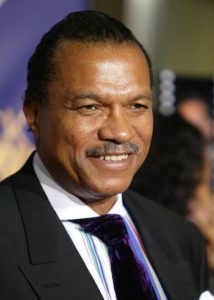
Billy Dee Williams
*Billy Dee Williams was born on this date in 1937. He is a Black actor, voice actor, and artist.
William December Williams Jr. was born in New York City, the son of Loretta Anne, a West Indian-born elevator operator at the Lyceum Theatre. She was an aspiring performer from Montserrat, and William December Williams, Sr., a Black and Native American caretaker from Texas. He grew up in Harlem. He used to go to Central Park to see the Negro League players and the Cuban baseball league, “They were fantastic, and I wound up working with a lot of those guys” (in The Bingo Long Traveling All-Stars & Motor Kings (1976)).
He has a twin sister, Loretta, and their maternal grandmother raised them while their parents worked several jobs. His mom had studied opera for years, becoming an accomplished opera star who wanted to break into movies. The family was richly cultured, exposing the children early on to drawing, painting, theatre, and similar creative experiences. Billy Dee would remain a fan of the arts, including opera.
In 1945, he made his Broadway debut at age seven, portraying a page in The Firebrand of Florence, Kurt Weill, and Ira Gershwin’s operetta starring Lotte Lenya. His mom, who worked at the theatre, volunteered him for the part he found boring. He returned to Broadway as an adult in 1960 in the adaptation of The Cool Word. He appeared in A Taste of Honey in 1960. A 1976 Broadway production, I Have a Dream, starred Williams as Martin Luther King Jr. His most recent Broadway appearance was in August Wilson's Fences, as a replacement for James Earl Jones in the role of Troy Maxson in 1988. Williams debuted in 1959 in The Last Angry Man, opposite Paul Muni, in which he portrayed a delinquent young man.
He was frustrated in the 1960s with the “paucity of parts for leading black men,” and the majority of roles he wanted going to Sidney Poitier. He enjoyed doing theater and television, but “his slow-building film career ate at him.” He rose to stardom after starring in the critically lauded blockbuster biographical television movie Brian's Song (1971). Williams said the role was the one he was most proud of: In the late 1980s, Williams resumed painting, devoting much of his time to the work.
He returned to New York and, for him, the center of the art scene. He also renewed his friendship with Peter Max, who had trained and sold art in the city and renewed Williams' interest in painting. Within two years, he “cranked out 120 original works of art.” Williams is the Honorary Chairman of Thelonious Monk Institute of Jazz (TMIJ) in Washington, D.C., which fosters jazz education. TMIJ has used his artwork each year for its competition programs since 1990. He had his first solo exhibition in 1991, followed by many throughout North America and the world.
Williams has been married three times, with three children and two grandchildren. His first marriage was to Audrey Sellers in 1959. In 1968, Williams married model and actress Marlene Clark in Hawaii. He married Teruko Nakagami on December 27, 1972. Williams was arrested on January 30, 1996, after allegedly assaulting his live-in girlfriend, whom the police did not identify. The woman later stated that the incident was her fault and hoped the police would drop the case. In a plea bargain, Williams agreed to undergo 52 counseling sessions.
In 2019, Williams talked about his feminine side in an interview and used masculine and feminine pronouns to refer to himself. Media outlets widely speculated that Williams might be gender fluid. Still, in Jungian psychology, he clarified that he was referring to anima and animus: the feminine side of men and the masculine side of women. He is best known as Lando Calrissian in the Star Wars franchise, first in the early 1980s and nearly forty years later in The Rise of Skywalker (2019), marking one of the most extended intervals between onscreen portrayals of a character by the same actor in American film history.